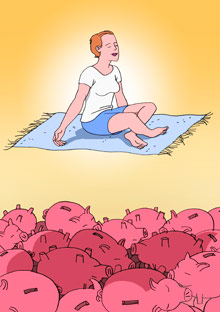5 Ways to Cope with Money Stress

Illustration: Jorge Columbo
While the market plunges, free-floating anxiety is rising. How to cope with all the excess worry? Nancy Palmer reports on a few soothing ideas.
Money anxiety disorder: That's what you might call the latest American epidemic (the acronym, conveniently, would be MAD). According to a survey in October by the American Psychological Association, 80 percent of us find the recent financial crisis a significant cause of stress—up from 66 percent last April—and women are bearing the brunt of the worry, reporting greater concern over job stability and health problems affecting their families, for example, than men are. "Money is a safety net, as in, 'I may not be able to count on people, but I can count on my cash,'" says the APA's public education coordinator for Pennsylvania, David Palmiter, PhD. "Now the thinking's gone to: 'There's nothing between me and the abyss.'" You can find plenty of advice from financial experts on how to cope. But what about the pervasive sense of panic, which can take a serious toll on health, putting you at higher risk for a host of ailments from high blood pressure to heart disease. Science has shown that exercise and meditation are two of the most effective ways to reduce stress—but you probably already know that, and likely feel too pressured to try either. So we asked a few experts for other strategies you might not have considered.
As a reminder, always consult your doctor for medical advice and treatment before starting any program.



